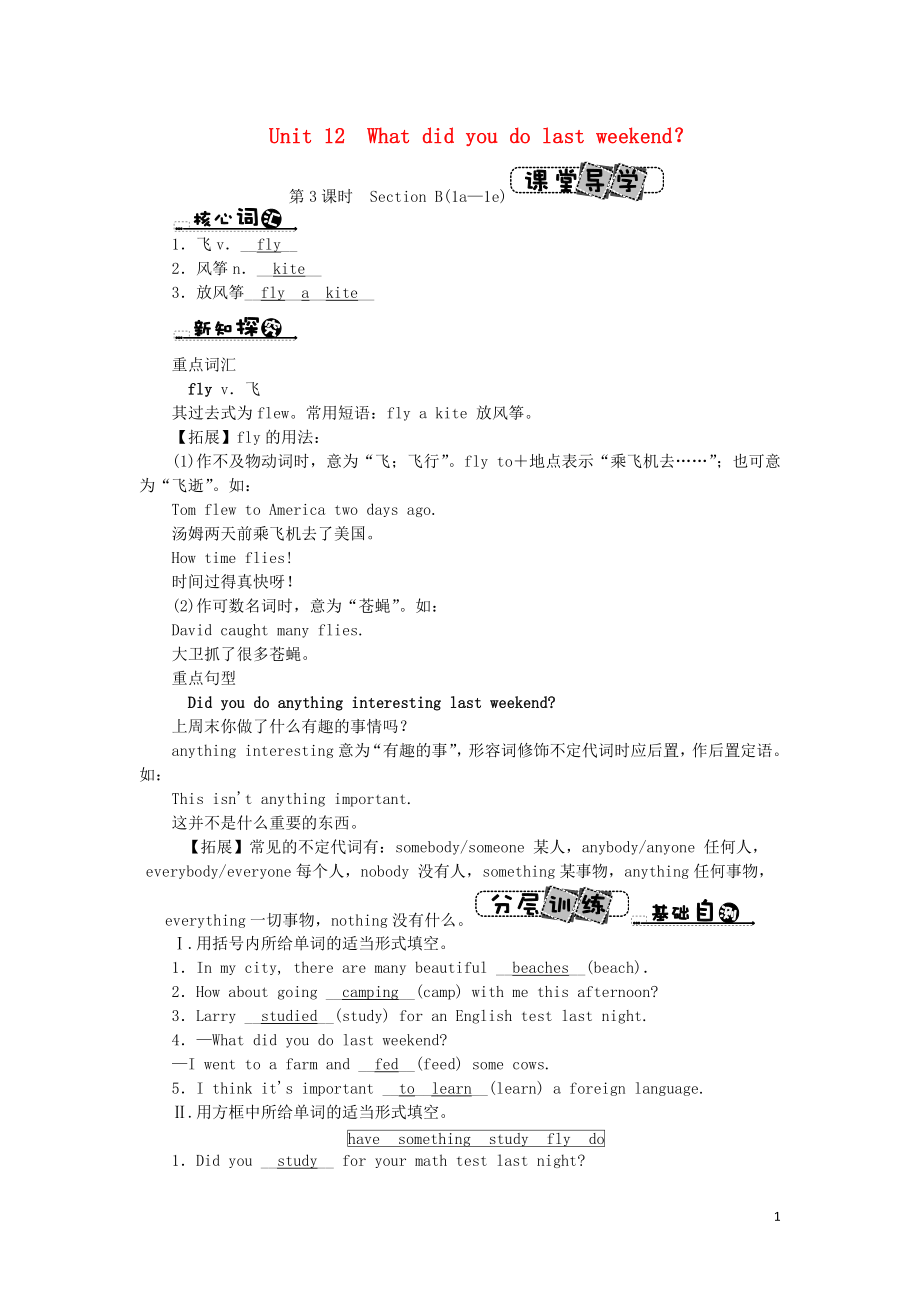《2019年春七年級(jí)英語下冊(cè) Unit 12 What did you do last weekend(第3課時(shí))Section B(1a-1e)課堂練習(xí) (新版)人教新目標(biāo)版》由會(huì)員分享,可在線閱讀�,更多相關(guān)《2019年春七年級(jí)英語下冊(cè) Unit 12 What did you do last weekend(第3課時(shí))Section B(1a-1e)課堂練習(xí) (新版)人教新目標(biāo)版(3頁珍藏版)》請(qǐng)?jiān)谘b配圖網(wǎng)上搜索����。
1�����、Unit 12 What did you do last weekend����?
第3課時(shí) Section B(1a—1e)
1.飛v.__fly__
2.風(fēng)箏n.__kite__
3.放風(fēng)箏__fly__a__kite__
重點(diǎn)詞匯
fly v.飛
其過去式為flew。常用短語:fly a kite 放風(fēng)箏�����。
【拓展】fly的用法:
(1)作不及物動(dòng)詞時(shí)��,意為“飛�;飛行”。fly to+地點(diǎn)表示“乘飛機(jī)去……”����;也可意為“飛逝”。如:
Tom flew to America two days ago.
湯姆兩天前乘飛機(jī)去了美國(guó)�。
How time flies!
2、時(shí)間過得真快呀����!
(2)作可數(shù)名詞時(shí)���,意為“蒼蠅”。如:
David caught many flies.
大衛(wèi)抓了很多蒼蠅�����。
重點(diǎn)句型
Did you do anything interesting last weekend?
上周末你做了什么有趣的事情嗎����?
anything interesting意為“有趣的事”,形容詞修飾不定代詞時(shí)應(yīng)后置���,作后置定語。如:
This isn't anything important.
這并不是什么重要的東西���。
【拓展】常見的不定代詞有:somebody/someone 某人�,anybody/anyone 任何人�����, everybody
3�����、/everyone每個(gè)人,nobody 沒有人�����,something某事物�����,anything任何事物���,everything一切事物��,nothing沒有什么����。
Ⅰ.用括號(hào)內(nèi)所給單詞的適當(dāng)形式填空��。
1.In my city, there are many beautiful __beaches__(beach).
2.How about going __camping__(camp) with me this afternoon?
3.Larry __studied__(study) for an English test last night.
4.—What did you do l
4�、ast weekend?
—I went to a farm and __fed__(feed) some cows.
5.I think it's important __to__learn__(learn) a foreign language.
Ⅱ.用方框中所給單詞的適當(dāng)形式填空。
1.Did you __study__ for your math test last night?
2.My friends and I __flew__ kites in the park last weekend.
3.Sally __did__ her homework at Tony
5�、's home last night.
4.Is there __anything__ interesting in the book?
5.I __had__ dinner with my friends yesterday.
Ⅲ.根據(jù)漢語意思完成句子,每空一詞����。
1.我剛才放了風(fēng)箏�。
I __flew__ __a__ __kite__ just now.
2.誰看望了我的姐姐��?
__Who__ __visited__ my sister?
3.昨天他和他朋友一起吃的晚飯���。
Yesterday he __had__ __dinner__ __with__ his frien
6����、ds.
4.莉莉正在房間里為考試而學(xué)習(xí)���。
Lily __is__ __studying__ for a test in her room.
5.在貝姬的生日聚會(huì)上�,他又唱歌又跳舞���。
At Becky's birthday party, he __sang__ and __danced__.
Ⅳ.單項(xiàng)選擇。
(C)1.Jenny often ________ to school early, but yesterday morning she ________ to school late.
A.go; went B.went; goes
C.goes; went D.wen
7���、t; went
(A)2.I ________ a very interesting book last week.
A.read B.readed
C.reading D.reads
(C)3.—Who visited the farm last Sunday?
—Eric ________.
A.do B.does
C.did D.was
(A)4.I met the old man ________ a cold spring morning.
A.on B.in
C.a(chǎn)t D.for
(D)5.Did you do ________ last week
8��、end?
A.interesting something
B.something interesting
C.interesting anything
D.a(chǎn)nything interesting
Ⅴ.閱讀理解�����。
Last week Johnny had a very busy weekend.On Saturday morning, he cleaned his room.That made his mother very happy.In the afternoon, he did his math homework.It was not difficult, so it
9����、only took him one hour to finish the homework.And in the evening, he went to visit his aunt with his parents.They had a big dinner there.The next morning, he went swimming after getting up.Usually he goes swimming twice a week.He loves it very much.After lunch he went to the school playground and pl
10、ayed football.That exercise makes him in a good health.On Sunday evening, he watched TV for an hour at home and then put the books in his schoolbag for the next day.
(B)1.What did Johnny do on Saturday morning?
A.He went shopping.
B.He cleaned his room.
C.He did his homework.
D.He went running.
11���、
(A)2.What about Johnny's math homework?
A.It was easy.
B.It was difficult.
C.It was too much.
D.It was important.
(D)3.Where was Johnny on Saturday evening?
A.At home.
B.In his school.
C.On the playground.
D.At his aunt's house.
(B)4.What did Johnny do after lunch on Sunday?
A.He played basketball.
B.He played football.
C.He went swimming.
D.He had a rest.
(C)5.Where did Johnny watch TV?
A.At his aunt's home.
B.At his school.
C.At his home.
D.We don't know.
3
 2019年春七年級(jí)英語下冊(cè) Unit 12 What did you do last weekend(第3課時(shí))Section B(1a-1e)課堂練習(xí) (新版)人教新目標(biāo)版
2019年春七年級(jí)英語下冊(cè) Unit 12 What did you do last weekend(第3課時(shí))Section B(1a-1e)課堂練習(xí) (新版)人教新目標(biāo)版

